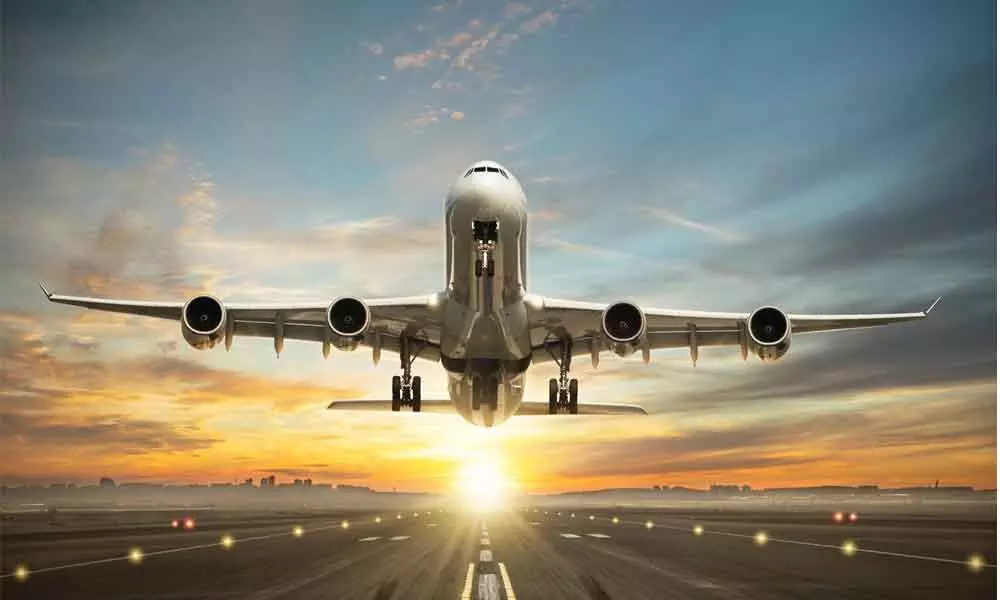Aerospace sector gearing up to regain past glory
Throughout lockdown, sustainability matched survivability among the aviation, defence businesses
image for illustrative purpose

As 2020 draws to its painful conclusion, we realize the magnitude of the havoc Covid-19 has wreaked on the industry. In March, this was not a Chinese problem, but in fact the start of a global pandemic. Airlines became grounded, airports closed, repatriation flights only staffed by crew looking for desperate flyers.
IATA was quick to stand up and call on governments to provide financial support to the grounded aviation industry that stimulates economies and connects people around the world.
Billions were lost, the threat to a recovery seemed nowhere in sight, and the hope things would rebound soon. But at a time when the world suddenly discovered insufficient personal protection equipment (PPE) to support the efforts of frontline health workers, aviation came into its own ferrying billions of tonnes of the valuable plastic around the world. Meantime almost every available freighter was in demand for fresh produce and medical supplies.
Aviation became seen as a lifesaver and vital even to the most outspoken environmentalist. A shortage of freighters led to sudden applications to convert grounded passenger aircraft to freighters using cabins to take parcels above the usual belly space for normal containers.
Some 40 per cent of the world's cargo is carried every day on passenger aircraft hence the sudden drop in capacity. This was a lifeline for some carriers and as we look towards 2021 then many airlines are already talking about the cargo strategy especially now there are different vaccines to counter the coronavirus being developed, approved and required right around the world and quickly.
While, it might have been thought that the Covid crisis might have meant the issue of emissions going to the back burner, it didn't. Throughout lockdown sustainability matched survivability among the aviation and defence businesses. There were eco-demonstrator aircraft showing new systems to reduce noise, fuel and emissions; air traffic management organisations were talking changes to decades old routing procedures and direct approaches; governments were unblocking previously restricted airspace; new zero emission aircraft were introduced including supersonic and positive steps towards the introduction of hydrogen fuelled aircraft; as well as regional and urban advanced air mobility were being put in place.
There were critics on the sustainability issue and there are many, despite evidence to the contrary rejoiced at the reduced aircraft in the skies and pointed to the cleaner air as being a real benefit and proof of aviation's "shame". Of course millions of people working at home, business closing or suspending manufacturing were also making a significant impact on the reducing emissions.
But the Covid-19 that changed the focus of passenger attention is still very firmly with us. As we close the doors on 2020, we know there are aircraft ready to fly. Tens of thousands of pilots unemployed awaiting a call back from their surviving airlines to get back on the flight deck. There are MRO providers with aircraft stored on every available bit of grass on airfields around the world ready to grease the parts to get them flying again.
Airports that have developed systems to safely allow contactless progress through their borders, and onto the aircraft are ready to show off their new procedures to safely keep distance and remain Covid safe. All that is needed is passengers and common government processes to allow entry and exit to travel again.
The industry also needs to work to lobby government but mostly to reassure with evidence that our industry will return as the safest means of transport; as an industry to committed to and already implementing environmental and sustainable practices and technology above and beyond the international agreements.
Passengers need to feel pride in their airline; They must be confident that the HEPA filters provide cabin air as safe as any operating theatre; happy that their cellphones contain the vital data for health and identification. Confidence is a must for industry to fit-for-purpose for the new year and perhaps the new ways of travelling in the future.
Public opinion can be a given a positive dose by delivering the precious vaccines efficiently although it will be harder than expected, especially in regions like Africa and Asia where infrastructure may not yet be ready.
But when we look ahead, the people, the skills can bring the industry back and the world can get flying again.

